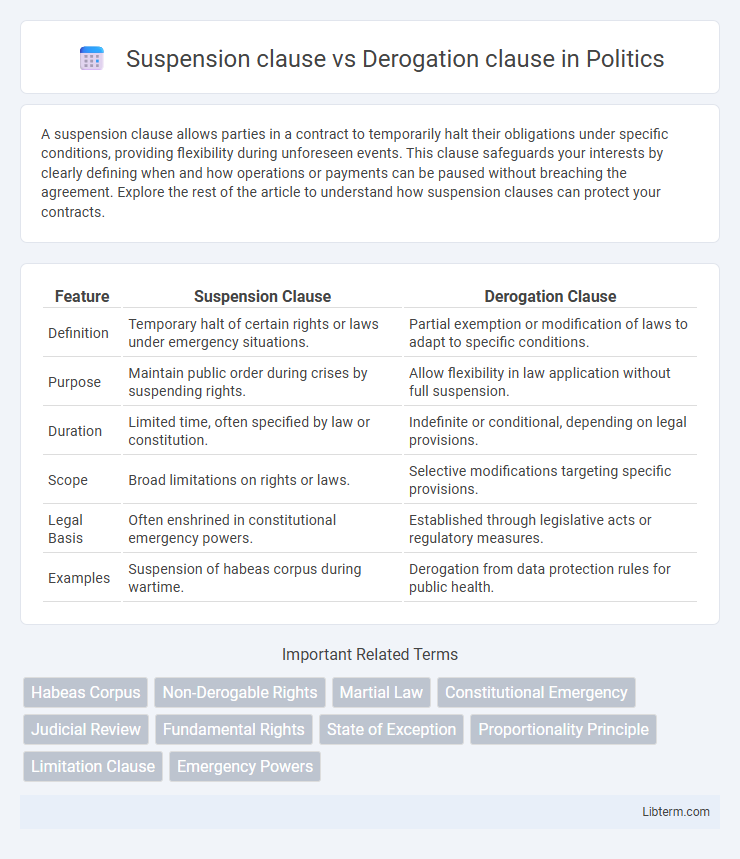A suspension clause allows parties in a contract to temporarily halt their obligations under specific conditions, providing flexibility during unforeseen events. This clause safeguards your interests by clearly defining when and how operations or payments can be paused without breaching the agreement. Explore the rest of the article to understand how suspension clauses can protect your contracts.
Table of Comparison
| Feature | Suspension Clause | Derogation Clause |
|---|---|---|
| Definition | Temporary halt of certain rights or laws under emergency situations. | Partial exemption or modification of laws to adapt to specific conditions. |
| Purpose | Maintain public order during crises by suspending rights. | Allow flexibility in law application without full suspension. |
| Duration | Limited time, often specified by law or constitution. | Indefinite or conditional, depending on legal provisions. |
| Scope | Broad limitations on rights or laws. | Selective modifications targeting specific provisions. |
| Legal Basis | Often enshrined in constitutional emergency powers. | Established through legislative acts or regulatory measures. |
| Examples | Suspension of habeas corpus during wartime. | Derogation from data protection rules for public health. |
Introduction to Suspension Clause and Derogation Clause
The Suspension Clause, found in the U.S. Constitution, protects the right to habeas corpus, allowing it to be suspended only in cases of rebellion or invasion where public safety requires it. The Derogation Clause, present in human rights treaties such as the European Convention on Human Rights, permits temporary suspension of certain rights during emergencies but mandates strict conditions to prevent abuse. Both clauses serve to balance individual rights with state security, defining legal frameworks for limiting rights under exceptional circumstances.
Defining the Suspension Clause
The Suspension Clause, found in Article I, Section 9 of the U.S. Constitution, protects the writ of habeas corpus by preventing its suspension except during cases of rebellion or invasion where public safety requires it. This clause ensures that individuals are not unlawfully detained without judicial review, maintaining a balance between civil liberties and national security. Unlike Derogation clauses, which allow temporary suspension or limitation of certain rights under specific circumstances, the Suspension Clause specifically addresses the extraordinary suspension of the writ of habeas corpus.
Understanding the Derogation Clause
The Derogation Clause in legal agreements permits temporary suspension or limitation of certain rights without fully nullifying the entire contract, differentiating it from the Suspension Clause which halts specific obligations temporarily. Understanding the Derogation Clause is essential as it allows parties to adapt contract terms during unforeseen events while maintaining the agreement's fundamental framework. This clause provides flexibility and ensures that limited changes do not lead to total contract termination, preserving overall legal stability.
Historical Context of Both Clauses
Suspension clauses historically emerged in treaties to temporarily halt obligations during conflicts or emergencies, providing flexible diplomatic tools without terminating agreements. Derogation clauses originated in human rights conventions, allowing partial or temporary suspension of specific rights under exceptional circumstances while preserving the treaty's overall integrity. Both clauses reflect evolving international legal frameworks responding to the need for balancing state sovereignty and treaty commitments during crises.
Legal Framework: Suspension Clause vs Derogation Clause
The Suspension clause and Derogation clause define different legal mechanisms within constitutional and international law frameworks. Suspension clauses typically allow temporary suspension of certain rights or obligations during emergencies, preserving the overarching legal order. Derogation clauses permit permanent or partial withdrawal from specific treaty obligations or legal provisions under defined circumstances, thereby adjusting the scope of applicable law.
Key Differences Between Suspension and Derogation Clauses
Suspension clauses temporarily halt the enforcement of specific contract obligations or rights without terminating the contract, preserving the original terms for future reinstatement. Derogation clauses modify or reduce the effect of particular contract provisions, effectively altering the parties' original rights or duties while the contract remains in force. The key difference lies in suspension clauses pausing obligations, whereas derogation clauses change or limit those obligations permanently or for a defined period.
Practical Applications in National and International Law
Suspension clauses enable temporary halting of treaty obligations under specific conditions, often employed during states of emergency or conflict to balance sovereignty and international commitments. Derogation clauses allow states to deviate from treaty obligations permanently or semi-permanently, typically invoked when certain rights or obligations conflict with domestic law or national security. Both clauses are crucial in national and international law for managing treaty flexibility while maintaining legal order and protecting essential state interests.
Case Studies: Real-World Examples
Suspension clauses and derogation clauses are often examined in landmark cases such as the European Court of Human Rights' *Hirst v. the United Kingdom* (2005), where derogation from certain rights during emergencies was scrutinized. In the *A and Others v. United Kingdom* (2009) case, derogation clauses permitted temporary suspension of habeas corpus, highlighting the legal boundaries of emergency powers. Conversely, suspension clauses featured in the *Greece v. Turkey* case, illustrating state obligations to halt specific treaty provisions without fully derogating from them.
Implications for Human Rights Protections
Suspension clauses allow states to temporarily limit certain human rights obligations during emergencies, but this can risk abuse and undermine fundamental protections if not strictly regulated. Derogation clauses specify which rights can be lawfully restricted, emphasizing non-derogable rights like the prohibition of torture and the right to life, ensuring core human rights remain protected even in crises. Understanding the scope and limitations of both clauses is essential to balance state security interests with the non-negotiable nature of fundamental human rights.
Conclusion: Balancing Security and Civil Liberties
Suspension clauses temporarily limit certain rights during emergencies to protect national security, while derogation clauses allow states to partially or fully exempt themselves from treaty obligations under specific conditions. Careful implementation of these clauses is crucial to maintain a balance between preventing threats and upholding civil liberties. Ensuring transparency, judicial oversight, and proportionality in applying suspension or derogation measures strengthens both security and human rights protections.
Suspension clause Infographic

 libterm.com
libterm.com